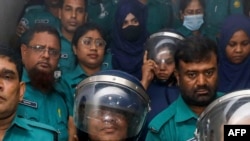Amid the political chaos in Bangladesh in August that included the ouster of the country's prime minister, journalists Farzana Rupa and Shakil Ahmed were arrested at an airport in the capital, Dhaka, while attempting to travel to Paris.
More than 150 days have passed since then, and the married couple remains jailed in the South Asian country on accusations that their legal team rejects as politically motivated.
"This is a particularly absurd example of using the law to target critics, but unfortunately, it's still resulting in them remaining in prison," human rights lawyer Caoilfhionn Gallagher, who is leading the couple's international legal team, told VOA.
The international legal team representing the journalists filed a complaint Wednesday with the United Nations over their detention, which analysts say underscores broader challenges facing journalists in Bangladesh.
Massive student-led protests erupted in Bangladesh in June 2024 and ultimately led to Prime Minister Sheikh Hasina resigning and fleeing to India. She had led the country since 2009.
About 870 people died in the protests, according to the health ministry led by interim Bangladesh government. While covering the violent demonstrations, several journalists were attacked, and two were killed, according to the Committee to Protect Journalists.
Many of journalists who have been targeted were viewed as pro-Hasina.
Rupa and Ahmed are among four journalists viewed as pro-Hasina who were still jailed in Bangladesh as of early December, according to CPJ. Rupa and Ahmed both worked at the Ekattor TV channel, which was considered pro-Hasina, and were critical of the protests, according to the Coalition for Women in Journalism.
Police claimed Rupa and Ahmed had incited Hasina's former government to kill protesters. The reporters were arrested in connection with the murder case of a garment worker who died during a demonstration in early August in Dhaka.
Bangladeshi journalist Khairuzzaman Kamal, who previously worked with Rupa and is friends with Ahmed, said they are good journalists.
"They maintain their professional ethics very much," said Kamal, of the Bangladesh Manobadhikar Sangbadik Forum journalist association.
But other analysts say that, like many journalists in Bangladesh, they were pro-Hasina — but that doesn't mean they should be imprisoned on politically motivated charges.
Even though Bangladesh has experienced significant media growth over the past 20 years, a lack of openness surrounding ownership and political affiliation has raised questions about editorial independence and threatened trust in the media, according to media reports.
Gallagher, who is based in London, said the case against her clients is an example of retaliatory lawfare, which is when governments use and abuse the law to target critics.
"The intellectual hoops you have to jump through to claim that journalism in itself may have contributed to a mindset, which may have contributed to an attack, which may have contributed to a death is just legally nonsensical," Gallagher said.
Kamal agreed. "It is a fabricated murder case against them because they are journalists," the journalist said.
By filing a complaint with the U.N. Working Group on Arbitrary Detention, Gallagher said she hopes the group will determine that Rupa and Ahmed's jailings are arbitrary.
"What we're seeing here is entirely unjust imprisonment without due process," she added.
Bangladesh's Embassy in Washington, U.N. office in Geneva, and Foreign Ministry did not reply to VOA's emails requesting comment.
Press freedom threatened
Press freedom has been under threat for years in Bangladesh, according to watchdog groups such as Amnesty International and Reporters without Borders.
Hasina's government was long accused of using severe tools, such as intimidating family members of exiled journalists, and harsh laws to stifle dissent and repress the media. In her last year in power, Bangladesh fell to 165th place out of 180 countries in the World Press Freedom Index, the country's worst ranking ever.
"It was very clear during Hasina's 15 years of rule in Bangladesh that the media was under tight control for a long time, and journalists have been constantly targeted because of their reporting," Beh Lih Yi, CPJ Asia program coordinator, told VOA.
Mubashar Hasan, a fellow at the University of Oslo, agreed. Hasan, who researches authoritarianism and press freedom in Bangladesh, told VOA that for years it was risky for journalists to report critically on issues involving the military and the prime minister's office.
"There were no-go places for their journalism," Hasan said.
After Hasina resigned in early August, Bangladesh formed an interim government led by politician and Nobel Peace Prize winner Mohammad Yunus.
In an October interview with the country's largest paper, Prothom Alo, Yunus appeared to advocate for press freedom.
"Write as you please. Criticize," he said. "Unless you write, how will we know what is happening or not happening?"
And in a November interview with the Bangladeshi newspaper The Daily Star, Yunus recognized that the murder accusations against journalists without evidence were unfair, saying, "This was hurriedly done, following the old laws and practices." More than 140 journalists have faced these accusations, according to Reporters Without Borders.
The interim government's stated commitment to defend press freedom is a good sign for the future, Beh said. But in practice, the forms of repression facing journalists have merely changed shape under the interim government.
Four journalists are still in jail, and in November, demonstrators attacked the offices of two major newspapers. Authorities have also frozen the bank accounts of several journalists, and the interim government canceled press accreditations for more than 160 reporters.
"What we are very alarmed by is even though the interim government has pledged to reform, what is happening does not actually reflect that commitment," Beh said. "They must not adopt the previous regime's playbook by using the law to target critics or by using the previous regime's playbook to settle old scores."




